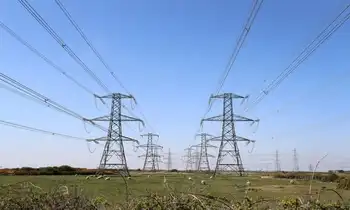Maine in “right place, right time” for energy corridor
“For the first time since the glaciers receded from the Maine Coast, we happen to be at the right place at the right time,” said Tony Buxton, a lobbyist for large-scale energy consumers in the state, to a legislative committee last week. “We can’t miss that opportunity.”
Lawmakers and Gov. John Baldacci are scrambling to make way for that energy to flow through the state, with the governor announcing two initiatives in the past three weeks to build energy corridors.
He announced March 10 during his State of the State address an agreement with Bangor Hydro to explore using the stateÂ’s roadways as corridors for underground energy transmission lines.
Then, March 24, Baldacci and New Brunswick Premier Shawn Graham traveled to each otherÂ’s country to announce the exploration of a second energy corridor that would connect Canada and Northern Maine.
Irving Oil, based in New Brunswick, agreed to bolster the effort with a feasibility study and potentially billions of dollars in investments.
Together, the two projects could provide a crucial link to opening markets in southern New England and beyond for MaineÂ’s and New BrunswickÂ’s burgeoning renewable energy industries.
That reality, however, remains a figment of the future until a range of organizational, technical, financial and environmental challenges are conquered.
John Kerry, director of BaldacciÂ’s Office of Energy Independence and Security, and Richard Davies, the Public Utilities CommissionÂ’s public advocate, will lead the effort.
The Joint Select Committee on MaineÂ’s Energy Future, which was specially appointed this session to lay the framework for these projects and others, is considering four bills that address various aspects of the overall energy initiative.
The bills are sponsored by House Speaker Hannah Pingree, D-North Haven; Senate President Elizabeth Mitchell, D-Vassalboro; Gov. Baldacci and House Assistant Majority Leader Seth Berry, D-Bowdoinham.
“It’s very clear that the sponsors of these bills have more in common than they have in terms of differences,” said Kerry. “It can be done. My thinking on it is that this is a real alternative to the current electricity grid regime in New England.”
Davies said his goal is to report back to Baldacci and Graham by the end of the year about the feasibility of a Northeast Energy Corridor between Maine and Canada.
“It’s going to take a fair piece of time to examine this,” said Davies. “Then we’ll determine whether there’s a second phase.”
Not the least of the challenges is deciding where the two corridors would be located and where they would connect with each other, if at all.
Another challenge is determining how much of the southern New England market could be served. At least one other entity, Hydro Quebec, is studying a similar energy corridor through New Hampshire.
David Allen, spokesman for Central Maine Power Co., urged the Energy Future Committee last week during testimony on Sen. MitchellÂ’s bill to negotiate the best possible deal for Maine.
“This corridor makes it possible to ship more power,” he said. “Our biggest chance to reduce our energy costs is to bring some of this renewable power to the ISO New England grid.”
Rep. John Martin, D-Eagle Lake, a cosponsor of MitchellÂ’s bill, told the committee that MaineÂ’s location gives it a substantial advantage.
“No other state has New Brunswick and Labrador who have available power they want to sell,” he said. “The only place they can go with it is through Maine. This is a one-time opportunity and if we don’t do it right we’ll forever regret that fact.”
Mitchell, whose bill proposes using proceeds from leasing the energy corridor for a range of economic development and energy projects, said the current recession is a reminder of the importance of major investments.
“We have a time here to do something substantial,” she said. “It crosses every jurisdiction. It is bold. This could happen sooner than you think. The stars seem to be aligned.”
Related News

National Grid warns of short supply of electricity over next few days
LONDON - National Grid has warned that Britain’s electricity will be in short supply over the next few days after a string of unplanned power plant outages and unusually low wind speeds this week.
The electricity system operator said it will take action to “make sure there is enough generation” during the cold weather spell to prevent a second major blackout in as many years.
“Unusually low wind output coinciding with a number of generator outages means the cushion of spare capacity we operate the system with has been reduced,” the company told its Twitter followers.
“We’re exploring measures and actions to make…





